Attention Turns to Extra Large Unmanned Underwater Vessels
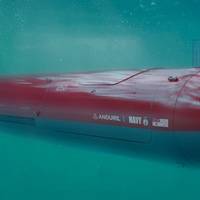
In August, 2021, after years of delays, cost overruns, and rising tensions, the Australian government canceled a A$90 billion order with France’s Naval Group for 12 conventionally powered submarines intended to replace the Royal Australian Navy (RAN)’s aging fleet of six Collins-class attack subs. Overnight, the future of the RAN’s undersea warfare capability was cast into uncertainty. The very next month, however, the United States and the United Kingdom announced a plan to help Australia fill the void…
Does Australia Need ‘Interim’ Submarines to Tide It Over Until Nuclear Boats Arrive?
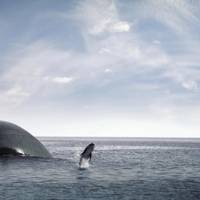
Last year experts raised their eyebrows when the Morrison government announced Australia would abandon its contract for French-built Attack class submarines, in favor of eight nuclear-powered submarines delivered under the AUKUS partnership.Retired Royal Australian Navy Chief Petty Officer Greg Jones was one key individual who questioned whether the choice is appropriate for Australia’s defense needs (at least in the short to medium term).One particularly controversial point is the time it will take for the nuclear submarines to become operational.
Australian Documents Showed French Submarine Project was at Risk for Years
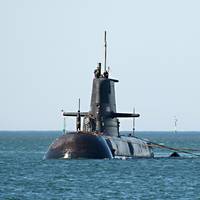
France should not have been surprised that Australia cancelled a submarine contract, as major concerns about delays, cost overruns and suitability had been aired officially and publicly for years, Australian politicians said.Paris has recalled its ambassadors from Canberra and Washington, saying it was blindsided by Canberra's decision to build nuclear-powered submarines with the United States and Britain rather than stick with its contract for French diesel submarines.Yet as early as September 2018, an independent oversight board led by a former U.S.
Aussie Pumps Wins Korean Navy Contract
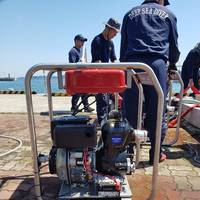
A Sydney base pump manufacturer and defense contractor has won a contract, to supply 3” engine drive salvage pumps for the Republic Of Korea Navy. The pumps are unique and have application not only in Korea, but in warships and support vessels throughout the world."The original requirement was for a lightweight portable diesel drive salvage pump, capable of handling saltwater,” said Chief Engineer, John Hales. "We'd already developed high pressure firefighting pumps for seawater applications in the form of both the Seamaster and Sea Skipper diesel drive machines’…
Ship Jobs to Fuel South Australian Recovery
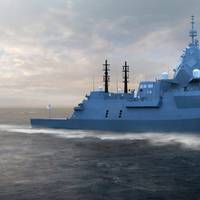
The ramping up of shipbuilding programs in Adelaide this year is providing an employment lifeline for South Australia as the state’s looks for ways to tackle boost jobs growth post coronavirus.There are already almost 700 people working on the Hunter Class Frigate Program. Those numbers are expected to reach 1000 by, the end of the year and 1,500 by mid-2025 before reaching a peak of 2,400 in 2028.Nine anti-submarine warfare frigates will be built by ASC Shipbuilding at the Osborne…
Two Firms Vie for Submarine Batteries Contract
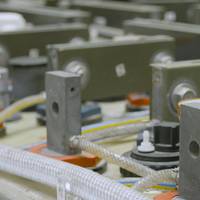
Contracts for the design of the Main Storage Batteries Stages 1 and 2 for the Attack Class submarines have been awarded. PMB Defence, based in Adelaide and Sunlight, based in Greece have been contracted to provide design, prototyping and qualification activities for the Main Storage Batteries. Both organizations will provide shipbuilder Naval Group with the data necessary to select one as the preferred MSB design for the Attack Class program in 2022.The Main Storage Batteries are responsible for supplying power to the propulsion system of the submarine and to other equipment on-board the ship.
Naval Group Teams-up with 9 Australian Firms
French shipbuilder Naval Group has signed nine different memoranda of understanding (MoU) with Australian companies to manufacture its countermeasure solutions for the Royal Australian Navy in Australia.The specialist in naval defence and marine renewable energy said that its Pacific unit is proposing a breakthrough in anti-torpedo countermeasures for Australia’s submarine and surface ship programs with CANTO, the latest countermeasure generation based on Dilution/Confusion multi-effects.This breakthrough in the field of anti-torpedo defence, applies the dilution/confusion concept to defend High Value and Mission Essential Units by generating a high-level acoustic signals over 360-degree…
Australia Opens Up Opportunities for UK Shipping
A major investment in new frigates and submarines by the Australian government has created long-term opportunities for UK and European businesses with relevant intellectual property and expertise, said Moore Stephens. This summer the Australian government awarded UK firm BAE Systems a contract to build nine next-generation frigates – known as the ‘Future Frigates’ project – worth A$35 billion, said a research report written by Moore Stephens' Michael Simms & Grant Miles.The programme, which will run for over 20 years, will create around 4,000 direct Australian jobs and give a particular boost to South Australia and the shipyards of Port Adelaide. Construction of the frigates is scheduled to begin in Adelaide from 2020, with the first vessels delivered in 2027 and the last by 2042.
Saab Control System for Collins Class Subs
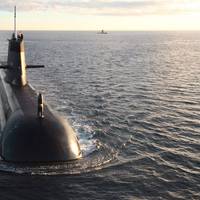
Saab announced it has signed a A$24.2 million (US$18.5 million) contract with ASC for supply of an updated Integrated Ship Control Management and Monitoring System (ISCMMS) for four Royal Australian Navy Collins class submarines. ISCMMS provides maneuvering and fully integrated ship management of propulsion, trim, power generation and ship services. Deliverables under the contract include updated hardware and spares that addresses obsolescence issues and maintains regional superiority edge for the Australian submarines.
Dechaineux Dives into Tri-lateral Submarine Exercise
Australian Navy submarine HMAS Dechaineux, has recently joined four Japanese submarines and United States Navy Los Angeles class attack submarine USS Key West in a Japanese Maritime Self-Defense Force trilateral exercise in waters south of Japan. The Submarine Competition (known as SUBCOMP) aims to further the anti-submarine warfare integration of the three navies, stressing each crew’s responses and tactics. The top performer is recognised with the Japanese Battle Efficiency Award. Commander Grady Hill, Key West’s Commanding Officer thought his crew performed well. “The crew found this exercise to be an excellent opportunity to plan, train and execute tactics while in a deployed environment,” he said.
USS Key West Participates in Tri-Lateral Submarine Exercise
The Los Angeles-class attack submarine USS Key West (SSN 722) participated in the Japan Maritime Self-Defense Force (JMSDF) Tri-Lateral Submarine Competition (SUBCOMP) exercise in waters south of Japan, which also included participation by a Royal Australian Navy (RAN) submarine, from Sept. 12 to 19. The SUBCOMP exercise provided an excellent opportunity to further the integration and tri-lateral coordination in an Anti-submarine warfare environment for the three navies. This year's SUBCOMP involved four JMSDF submarines, a RAN Collins-class submarine HMAS Dechaineux (SSG 76) and Key West. The competition stressed each crew's ability to conduct various aspects of anti-submarine warfare. The top performer is recognized with the Japanese Battle Efficiency Award.
Australian Navy: Torpedo Firings on the Mark
The Royal Australian Navy has tested its primary anti-submarine warfare weapon during Exercise OCEAN EXPLORER off the coast of Western Australia recently. HMAS Melbourne, with the support of Collins class submarine HMAS Dechaineux, conducted three exercise firings of its MU90 torpedo. Staff Officer Force Anti-Submarine Warfare Lieutenant Commander Chris Straughan from the Australian Maritime Warfare Centre embarked in Melbourne for the trial. Lieutenant Commander Straughan said the torpedo was designed to counter any type of nuclear or conventional submarine. “The MU90 torpedo provides the Royal Australian Navy with one of the most capable lightweight torpedoes in the world. It is designed to detect and attack deep, quiet running submarines,” he said.
Australia Names Lockheed Martin as Weapons System Provider for Submarines
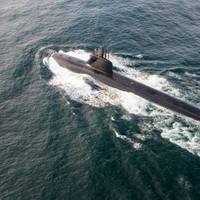
Australia has selected U.S. defence company Lockheed Martin Corp as its preferred bidder to supply the combat system for its new $38 billion fleet of submarines, the country's defence industry minister said on Friday. Lockheed Martin beat out competition from U.S. rival Raytheon Co, which built the system for Australia's existing Collins-class submarines. Australia chose French naval contractor DCNS Group in April to build 12 new submarines in a deal worth A$50 billion ($38 billion) - one of the world's most lucrative defence contacts.
France sinks Japanese, German Sub Bids
Fleet of 12 submarines to be built in South Australia; decision has political implications at home, abroad. France has beaten Japan and Germany to win a A$50 billion ($40 billion) deal to build a fleet of 12 submarines for Australia, one of the world's most lucrative defence contracts, Australian Prime Minister Malcolm Turnbull announced on Tuesday. The victory for state-owned naval contractor DCNS Group underscored France's strengths in developing a compelling military-industrial bid, and is a blow for Japanese Prime Minister Shinzo Abe's push to develop defence export capabilities as part of a more muscular security agenda. Reuters earlier reported that DCNS would be announced as the winner, citing sources with knowledge of the process.
France's DCNS Wins $40 bln Australian Submarine Contract
France's state-owned naval contractor DCNS Group has won a A$50bn ($40 billion) contract to build 12 submarines for the Australian Navy, beating bids from Japan and Germany. Malcolm Turnbull, Australia’s prime minister, announced that DCNS awarded tender over Germany and Japan to build fleet of Barracuda-class submarines in South Australia. The decision to build a new fleet of submarines in partnership with DCNS represented “a momentous national endeavour,” he said. The Shortfin Barracuda submarines will be built in Adelaide using Australian steel, creating 2,800 jobs, he said. French President Francois Hollande hailed the decision as historic.
Submarine Bidders Step up Lobbying for Australia Tender
Japan's advanced attack Soryu submarine carried out drills with Australia's navy on Tuesday as a German company launched a campaign to advertise its expertise - as a race for a A$50 billion contract to build Australia's next submarine fleet neared a climax. Industry sources told Reuters the Australian government is speeding up its decision on the contract - France is the other major bidder - with a winner now expected to be announced by the end of the month. Australia intends to buy 12 new submarines, a centrepiece of its defence strategy unveiled in February, which called for an increase in military spending of nearly A$30 billion over the next 10 years to protect strategic and trade interests in the Asia-Pacific.
SENER Signs a Contract with ASC for FORAN
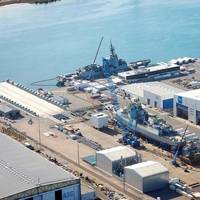
The SENER engineering and technology Group has signed a contract with Australian shipbuilder ASC for the implementation of the shipbuilding CAD/CAM System FORAN, developed by SENER, to be used as the software tool in the stability calculations supporting the construction of the Air Warfare Destroyers (AWD) conducted by the Air Warfare Destroyer Alliance. The execution of this contract began with an initial training in the Naval Architecture Module of FORAN, which took place at the Maritime Skills Centre at Techport Australia.
Merkel Backs German Bid to Build Australian Submarine Fleet
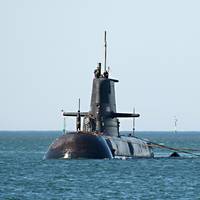
Chancellor Angela Merkel voiced her government's support on Friday for a German arms manufacturer's bid to win a $35.7 billion (A$50 billion) contract from Australia to build it a new fleet of submarines. Germany's ThyssenKrupp Marine Systems (TKMS) and France's state-controlled naval contractor DCNS are competing with Japan for the deal, seen in part as an Australian effort to counter Chinese assertiveness in the Asia-Pacific region. "The German government supports the German bid…
South Australia Seeks Shipbuilding Job Guarantees
The South Australian Government has outlined three key points on shipbuilding it wants addressed by the Commonwealth's Defence White Paper next month. It wants (1) a minimum 70 per cent Australian worker participation in the building, similar to the Collins Class submarines, (2) a guarantee the future naval submarines and frigates will be built in Australia and (3) that the local industry will have a continuous building program. The Abbott Government has put the development of the next Australian submarine program through a competitive evaluation process. South Australia has demanded an overseas submarine building program be ruled out before the federal government releases its Defence white paper.
Australian Leader Swap Weakens Japanese Sub Bid
The ouster of Australian Prime Minister Tony Abbott has further weakened a Japanese bid for one of the world's most lucrative defence contracts, a A$50 billion ($36 billion) programme to build stealth submarines for Australia, sources say. Australia got its fifth prime minister in as many years on Monday after the ruling Liberal Party voted to replace Abbott with former investment banker Malcolm Turnbull, following months of infighting and crumbling voter support. Abbott and Japanese Prime Minister Shinzo Abe, who ended a decades-old ban on weapons exports last year, enjoyed a close relationship that saw Japan emerge as the early front runner to replace Australia's aging Collins class subs.
A Pleasant Sub-prise for Penang Ferry Passengers
The sudden appearance of a submarine has caused excitement among hundreds of ferry users at Penang Port, Malaysia. The Australian navy submarine HMAS Sheean arrived in for a visit Penang at around 11.30am Monday. HMAS Sheean is in the port for the crewmen’s holiday before they start a joint exercise with a Malaysian submarine later. Penang Port Sdn Bhd senior general manager (corporate support division) Md Derick Basir said the vessel, which is 77.8m long and 7.8m wide, will be here until Oct 2. In a statement, the Royal Malaysian Navy said Collins-class submarine HMAS Sheean was in Malaysian waters for a joint exercise with KD Tunku Abdul Rahman in Kota Kinabalu on Oct 12 and Oct 13. HMAS Sheean is the fifth Collins Class Submarine built by the ASC in Adelaide, Australia.
Japan Renews Submarine Bid for Australia
Japan looking to fix faltering Australian submarine bid. Japan is ready to match European rivals and build a fleet of submarines for Canberra entirely at Australian shipyards, a senior Japanese official said on Tuesday, after stumbling in its effort to win the A$50 billion ($34.76 billion) contract. Tokyo was willing to train hundreds of Australian engineers in Japan's submarine-manufacturing hub of Kobe as well as in Australia as part of its offer for one of the world's biggest defence contracts, Masaaki Ishikawa, director general for Acquisition Reform at the Ministry of Defense, told Reuters. His comments are the first from an official directly involved in the bid that Japan is willing to build the stealth submarines entirely in Australia, where jobs are a hot button political issue.
Japan's Chase for Australian Subs Deal
Japan has confirmed it is ready to build Australia’s submarines entirely at local shipyards, after stumbling in its effort to win the A$50 billion ($34.76 billion) contract, reports Reuters. According to Masaaki Ishikawa, director general for Acquisition Reform at the Ministry of Defense, Tokyo was willing to train hundreds of Australian engineers in Japan's submarine-manufacturing hub of Kobe as well as in Australia as part of its offer for one of the world's biggest defence contracts. It is the first time an official directly involved in the bid has said Japan was willing to build the stealth submarines entirely in Australia. Canberra is expected to order between eight and 12 vessels.





